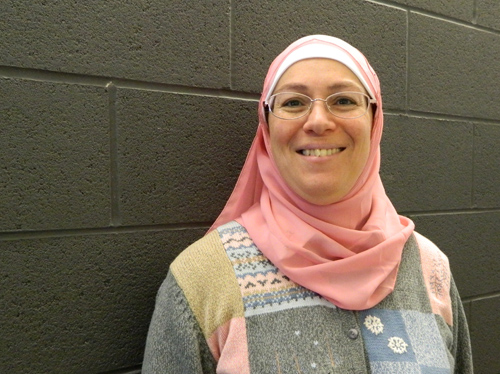
Engineering professor Soha Moussa describes herself as a problem-solver. Channelling that skill into engineering seemed natural to her because she grew up in a world of engineers: her father was an industrial engineering professor at the Université de Moncton in New Brunswick.
Moussa grew up in New Brunswick and started her undergraduate studies at the university there. After she’d completed two years, her father took a sabbatical and leave of absence to teach in Cairo, bringing his family with him. That allowed Moussa to finish her studies at the American University in Cairo. She then worked for two years in Egypt with multinational companies Carrier Air Conditioning and Bechtel, and did some consulting for York Air Conditioning.
She completed her master’s degree at the Université de Moncton and after graduation worked for a term with the National Research Council in Ottawa. She completed her PhD at the University of Waterloo.
Shortly after earning that degree, Moussa gave birth to her first son and stayed home to care for him until after she’d had a second son. Then she started work at Wilfrid Laurier University’s School of Business.
After teaching there for seven years, Moussa left to teach online courses in engineering to people who wanted to receive their professional engineer designations. “All potential professional engineers must write a laws and ethics exam,” she explains. “People who are not graduates of an accredited university program or who are foreign-trained would also need to write technical exams in their field. The courses I taught prepared them for those exams.”
At U of G, Moussa will focus on teaching. “It’s something I very much enjoy – I love seeing the light go on when someone is learning something new,” she says. Her approach to teaching is to use examples to relate the theory to the practical, and to encourage class interaction and participation. “I will relate what we are learning to items in the news, or from daily life, or try to show how this will be used when the students are working,” Moussa explains.
Her early research studies were on cellular manufacturing and group technology. “Traditional manufacturing is laid out in one of two ways,” says Moussa. “The first is the production line, and the second is the ‘job shop’ where similar machines are grouped together in the same location and products come to them.”
Moussa’s work analyzed the products being made in a particular company and grouped them into “families” depending on the parts needed for each product and the order in which the parts were used. Then the machines used for various aspects of production could be arranged into manufacturing “cells” that made sense for most products. “With this approach, you can get the efficiencies that come from a production line arrangement even if you don’t have mass production,” she says. Her research looked at ways to identify the families and cells.
Her next step would be to enhance that research to deal with situations where the company’s product mix is always changing, and when supply chains and shipping have to be taken into account.
This experience with efficient problem-solving helps at home, too, with weekends and evenings busy juggling the demands of her two sons who are national-level divers training in London, Ont. “It’s time-consuming, and the sport is very tough both physically and mentally, but my sons love it and do well at it.”
She’s proud of the way her sons, ages 12 and 14, have overcome a rather late start in the sport to win at high levels. “My one son is a bit afraid of heights, and every time he has to learn to dive from a greater height, it’s a new challenge for him to work through,” she adds. “But he does it.”